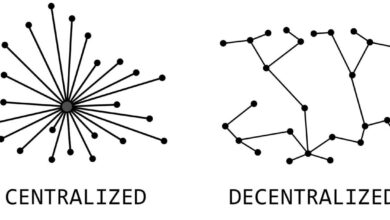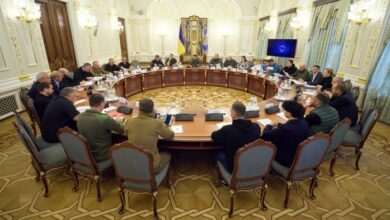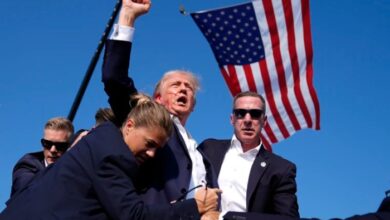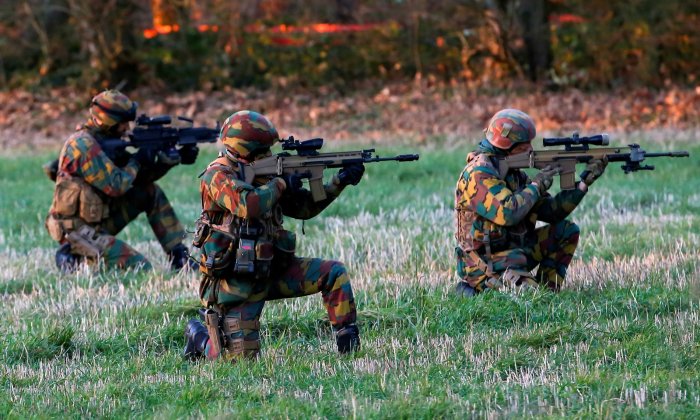
A European Defense Force: Unity in the Face of Challenges
A European defense force has been a recurring topic of debate for decades, a concept that sparks both hope and skepticism. The idea of a unified European military force, capable of acting independently on the global stage, has long been a dream for some, while others view it with caution, wary of its potential implications for NATO and transatlantic security.
The historical context for this discussion is rich and complex, tracing back to the aftermath of World War II. The formation of NATO, while providing a crucial security framework for Europe, also highlighted the limitations of individual nation-states in effectively responding to evolving security threats.
This, coupled with the rise of new challenges like terrorism and cyber warfare, has fueled the ongoing debate about the necessity and feasibility of a European defense force.
Historical Context: A European Defense Force
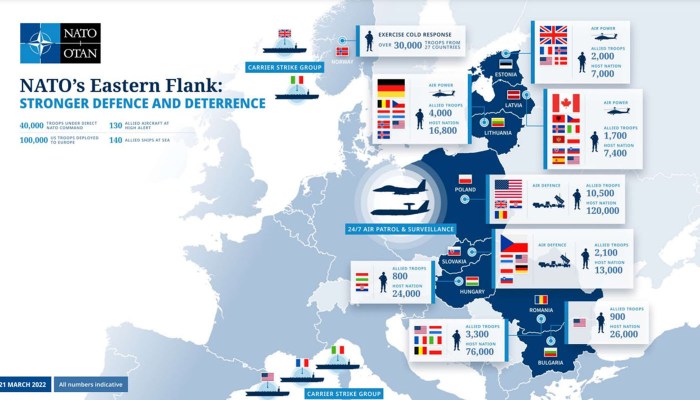
The idea of a unified European defense force has been a recurring theme in European history, driven by the desire for peace and security on the continent. After the devastation of World War II, the need for a collective security framework became paramount, leading to the formation of the North Atlantic Treaty Organization (NATO) in 1949.NATO’s primary objective was to deter Soviet aggression and provide collective defense for its members.
This alliance played a crucial role in maintaining peace and stability in Europe during the Cold War. However, the end of the Cold War and the subsequent expansion of NATO eastward led to a shift in the security landscape.
The Role of NATO in European Security
NATO’s influence on European security has been profound, serving as the primary security umbrella for its members. The alliance’s collective defense commitment, embodied in Article 5 of the North Atlantic Treaty, provides a strong deterrent against external threats. NATO’s military capabilities, combined with its political and diplomatic weight, have helped maintain stability and prevent conflict in Europe.
The alliance’s presence has also fostered cooperation and interoperability among its members, enhancing their military capabilities and strengthening their collective defense posture. NATO’s military exercises and training programs have contributed to the development of a shared military culture and a sense of common purpose among its members.
Challenges to the Creation of a Unified European Defense Force
Despite the shared history of European defense cooperation and the presence of NATO, the creation of a unified European defense force has faced significant challenges. These challenges can be categorized into political, economic, and military aspects.
Political Challenges
- National Sovereignty:Member states are reluctant to relinquish control over their defense policies and military forces. The idea of a unified defense force could be perceived as a threat to national sovereignty and autonomy.
- Divergent Security Interests:European countries have different security priorities and perceptions of threats. This diversity of interests makes it difficult to agree on a common defense strategy and allocate resources effectively.
- Lack of Political Will:There has been a lack of consistent political will to pursue the creation of a unified defense force. Some countries have been more committed to the project than others, leading to a fragmented approach.
Economic Challenges
- Funding:Establishing and maintaining a unified defense force would require significant financial resources. Member states may be unwilling to contribute equally, leading to disputes over funding and resource allocation.
- Industrial Base:Europe’s defense industry is fragmented, with different countries specializing in different areas. Creating a unified defense force would require harmonizing national defense industries and potentially consolidating certain capabilities.
Military Challenges
- Interoperability:The military forces of different European countries use different equipment, doctrines, and training methods. Achieving interoperability among these forces would be a major challenge, requiring significant investment and coordination.
- Command and Control:Establishing a unified command structure for a European defense force would require agreement on how to share decision-making authority and ensure effective coordination of operations.
Current Landscape
The European defense landscape is a complex tapestry woven with threads of cooperation, competition, and historical baggage. While the desire for a united front is strong, achieving true integration remains a challenge.
Current State of European Defense Cooperation
European defense cooperation is characterized by a mix of progress and challenges. While several initiatives have been launched to strengthen collaboration, including the Permanent Structured Cooperation (PESCO) and the European Defence Fund (EDF), achieving a truly unified force remains elusive.
A European defense force is a complex issue, requiring careful consideration of its potential benefits and challenges. It’s a bit like debating whether Star Wars: Phantom Menace or New Hope is the better film – both have their strengths and weaknesses.
Ultimately, the success of a European defense force will depend on its ability to address the specific security needs of its member states while fostering a strong sense of unity and shared purpose.
Major Players and Their Roles
Several key players contribute to shaping the European defense landscape:
- France:A staunch advocate for a more integrated European defense, France has historically been a leading military power in Europe. France is pushing for a more independent European defense posture, less reliant on the United States.
- Germany:Despite its constitutional constraints on military deployments abroad, Germany has been gradually increasing its defense spending and taking on a more active role in European defense cooperation. It has also played a crucial role in facilitating the development of the European Defence Fund.
- United Kingdom:While no longer a member of the European Union, the UK remains a significant military power and a key partner for many European countries. Its departure from the EU has raised questions about the future of European defense cooperation.
- NATO:While not a European organization, NATO remains a vital framework for defense cooperation between European countries and the United States. NATO’s role in European security is likely to remain important for the foreseeable future.
Existing Defense Capabilities and Resources
European countries possess a wide range of defense capabilities and resources, but these are often unevenly distributed. Some countries, like France and the UK, have strong military capabilities and large defense budgets, while others have more limited resources.
- Military Capabilities:European countries possess a wide array of military capabilities, including:
- Land forces
- Air forces
- Naval forces
- Special forces
- Defense Spending:Defense spending varies significantly across Europe. Some countries, like France and the UK, dedicate a significant portion of their GDP to defense, while others, like Germany, have historically invested less. In recent years, however, there has been a trend towards increased defense spending across Europe.
Motivations and Objectives
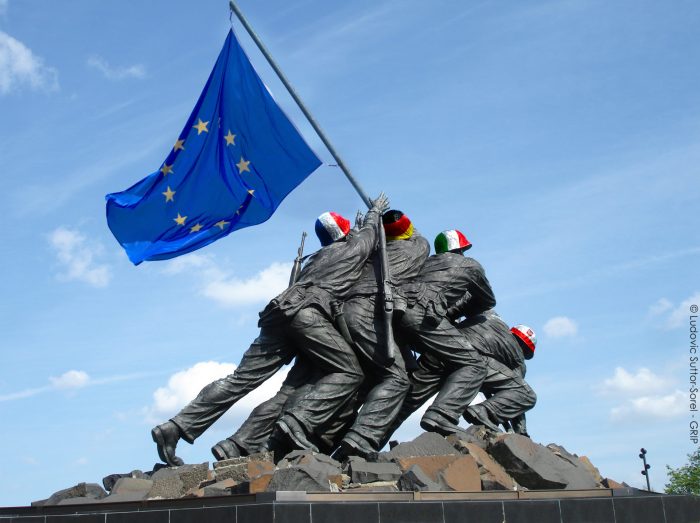
The idea of a European defense force has been gaining traction in recent years, fueled by a complex mix of geopolitical shifts and evolving security concerns. The motivation behind this push stems from a desire to enhance European autonomy and strategic independence on the global stage.
Motivations for a European Defense Force
The push for a European defense force is driven by several key motivations:
- Increased Security Threats:The rise of new security challenges, including terrorism, cyberattacks, and hybrid warfare, has highlighted the need for a more coordinated and robust European defense posture. The ongoing conflict in Ukraine has further underscored the importance of European defense cooperation.
- Strategic Autonomy:Europe’s reliance on the United States for its security has been a source of concern for many European leaders. A European defense force would allow Europe to act more independently on the world stage and reduce its dependence on external actors.
A European Defense Force has been a hot topic for years, and it’s easy to see why. With the rise of new threats and the uncertainty surrounding the future of NATO, it’s natural to wonder if a more unified European military force is needed.
But the idea also raises questions about the future of US influence in Europe, and even about the potential for domestic surveillance, as seen in the recent controversy over is the pentagon spying on americans. Ultimately, the debate over a European Defense Force is likely to continue, and its outcome will have a profound impact on the global security landscape.
- Cost Efficiency:The development and maintenance of separate national defense forces can be costly and inefficient. A European defense force could potentially reduce overall defense spending by sharing resources and expertise.
- Enhanced Political Influence:A stronger European defense force would give Europe greater political weight in international affairs and enable it to play a more active role in global security.
Objectives of a European Defense Force
The objectives of a European defense force are multifaceted and include:
- Collective Defense:The primary objective is to provide a collective defense mechanism for its member states. This would involve the pooling of resources and capabilities to deter and respond to external threats.
- Crisis Management:A European defense force would be equipped to manage crises, including natural disasters, humanitarian emergencies, and peacekeeping operations.
- Strategic Autonomy:The force would aim to enhance Europe’s strategic autonomy by reducing its dependence on external actors and providing it with the means to act independently on the world stage.
- Military Capabilities:A European defense force would require the development and maintenance of a range of military capabilities, including land, air, and naval forces, as well as advanced technology and cyber defense capabilities.
Benefits of a European Defense Force
The potential benefits of a European defense force are significant:
- Enhanced Security:A collective defense force would strengthen European security by providing a more robust deterrent against potential threats.
- Increased Political Influence:A stronger European defense force would give Europe greater political weight in international affairs, allowing it to play a more active role in global security.
- Cost Efficiency:By pooling resources and expertise, a European defense force could potentially reduce overall defense spending and achieve greater efficiency.
- Technological Advancements:A European defense force could foster greater cooperation in research and development, leading to advancements in military technology.
Challenges of a European Defense Force
The establishment of a European defense force presents a number of challenges:
- National Sovereignty:Member states may be reluctant to cede control over their defense forces to a supranational entity. This could lead to resistance from countries that are wary of losing sovereignty.
- Political Will:The success of a European defense force depends on the political will of member states to cooperate and make necessary compromises. Achieving consensus on issues such as command structure, resource allocation, and operational deployments can be challenging.
- Military Capabilities:Building a credible European defense force would require significant investment in military capabilities, including personnel, equipment, and training. This could strain national budgets and require a commitment to long-term investment.
- Integration and Coordination:Integrating national defense forces into a single, cohesive entity would require significant effort in terms of standardization, interoperability, and command and control.
Structure and Organization
The creation of a unified European defense force necessitates a well-defined organizational structure that ensures effective coordination, command, and control. This structure must balance the need for centralized decision-making with the preservation of national sovereignty and autonomy.
Command and Control
The command and control structure of the European defense force is a crucial aspect of its functionality. A clear chain of command is essential for efficient decision-making and deployment of forces. The structure should allow for a balance between centralized control and national autonomy, enabling swift responses to security threats while respecting the sovereignty of member states.
- A European Defense Council, composed of representatives from each member state, could be established to provide strategic direction and oversight. This council would be responsible for setting defense policy, allocating resources, and approving major military operations.
- A European Chief of Defense could be appointed to oversee the day-to-day operations of the force. This individual would be responsible for coordinating military activities, ensuring interoperability between national forces, and managing the force’s budget.
- Regional commands could be established to oversee military operations in specific geographic areas. This structure would allow for more localized responses to threats and would facilitate coordination with national forces.
Operational Structure
The operational structure of the European defense force should be designed to ensure effective deployment and utilization of military assets. This structure should reflect the diverse capabilities of member states and enable the force to respond to a wide range of security threats.
The idea of a European defense force is gaining traction, but it raises complex questions about funding and control. It’s important to consider the influence of corporate power in such a scenario, especially given the corporate power facts and stats that reveal their significant role in shaping global economies and politics.
A European defense force, if realized, must be carefully structured to prevent undue influence from any single entity, ensuring it serves the interests of all member states.
- The force could be organized into a number of operational components, each with a specific mission and area of expertise. These components could include:
- A rapid reaction force for immediate deployment to crisis zones.
- A maritime force for protecting sea lanes and deterring maritime threats.
- An air force for air defense and air power projection.
- A cyber defense force for protecting critical infrastructure and responding to cyberattacks.
- These components could be combined to form joint task forces for specific operations, allowing for a flexible and adaptable response to security challenges.
Control Mechanisms
Effective control mechanisms are essential for ensuring that the European defense force operates within a framework of accountability and transparency. These mechanisms should include:
- A robust system of oversight and accountability, with mechanisms for reviewing the force’s activities and ensuring compliance with international law and human rights standards.
- Clear rules of engagement for the use of force, with a focus on minimizing civilian casualties and upholding the principles of proportionality and necessity.
- Regular audits and evaluations of the force’s performance, to identify areas for improvement and ensure that the force remains effective and efficient.
Capabilities and Resources
A European defense force necessitates a robust set of capabilities and resources to effectively fulfill its mission. This includes the necessary military assets, personnel, and financial resources to achieve its objectives. The force must be able to respond to a range of threats, from traditional military conflicts to hybrid warfare and cyberattacks.
Funding Sources
Securing adequate funding is crucial for establishing and sustaining a European defense force. Several potential sources can contribute to financing this endeavor:
- National Contributions:Member states can contribute a portion of their national defense budgets to the European defense force. This approach mirrors the current funding model for NATO, where member states contribute to the alliance’s collective defense.
- European Union Budget:The EU budget can allocate a specific percentage to support the European defense force. This approach would ensure a stable and predictable source of funding, but it might face challenges in securing consensus among member states.
- Joint Procurement:Member states can collaborate on the procurement of military equipment, leveraging economies of scale to reduce costs. This approach would require significant coordination and agreement on shared requirements.
- Private Investment:Private companies and investors could contribute to the development and deployment of defense technologies. This approach could attract innovation and investment, but it raises concerns about potential conflicts of interest and the influence of private entities on defense policy.
Logistical and Operational Challenges
Coordinating and deploying a European defense force presents significant logistical and operational challenges:
- Interoperability:Ensuring that the different military forces from member states are compatible in terms of equipment, doctrine, and procedures is essential for effective joint operations. This requires significant coordination and standardization efforts.
- Command and Control:Establishing a clear and effective command and control structure for the European defense force is crucial for efficient decision-making and operational effectiveness. This involves defining roles and responsibilities for the different national contingents and the overall force command.
- Deployment and Logistics:Deploying a European defense force requires efficient logistics and support infrastructure, including transportation, communication, and medical facilities. This poses logistical challenges, especially for rapid deployment and sustained operations in different theaters.
- Political Will and Consensus:Sustaining a European defense force requires strong political will and consensus among member states. This involves overcoming historical divisions and national interests to achieve common goals and objectives.
Challenges and Considerations
The establishment of a European defense force presents a complex array of political, bureaucratic, and strategic challenges that require careful consideration. While the idea holds significant promise, its realization necessitates overcoming various hurdles and navigating potential consequences.
Political and Bureaucratic Challenges
The political landscape of Europe is characterized by diverse national interests, historical rivalries, and varying levels of commitment to defense cooperation. The creation of a European defense force would require a high degree of consensus and coordination among member states, a feat that has proven difficult to achieve in the past.
Furthermore, the bureaucratic structures and decision-making processes within the European Union (EU) are complex and often slow, potentially hindering the efficient development and deployment of a unified force.
Impact on NATO and Transatlantic Security
The potential impact of a European defense force on NATO and transatlantic security is a subject of considerable debate. Some argue that a stronger European defense capability would enhance NATO’s collective defense posture and reduce reliance on the United States.
Others express concern that a European defense force could lead to duplication of effort, undermine NATO’s unity, and potentially weaken transatlantic security ties.
Ethical and Legal Considerations
The use of a European defense force raises important ethical and legal considerations. The force’s mandate, rules of engagement, and accountability mechanisms must be clearly defined to ensure that its actions are consistent with international law and human rights principles.
Additionally, the potential for the force to be used in situations where there is no clear consensus among member states raises concerns about the legitimacy and accountability of its operations.
Future Prospects
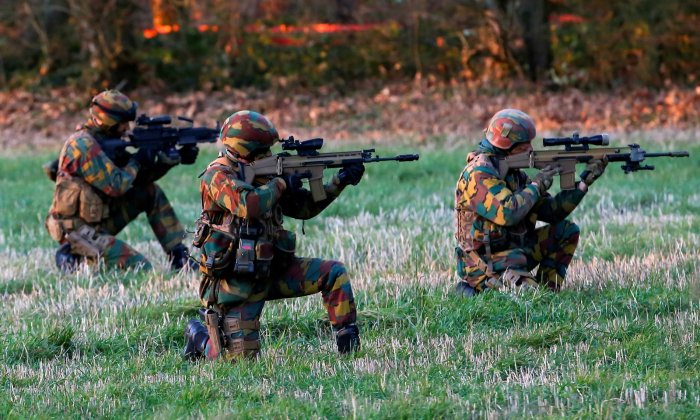
The establishment of a European defense force is a complex and multifaceted issue, with numerous factors influencing its feasibility and potential impact. While the concept has gained traction in recent years, a unified defense force remains a distant prospect.
Feasibility and Likelihood
The likelihood of a European defense force being established in the near future is highly uncertain. Several significant obstacles impede its realization, including:
- National Sovereignty:Member states are deeply attached to their national defense capabilities and are reluctant to cede significant control to a supranational entity. The concept of a European defense force often evokes concerns about national sovereignty and the potential for reduced autonomy in defense decision-making.
- Divergent Interests:European countries have varying security priorities and defense doctrines, making it challenging to reach consensus on the purpose, scope, and structure of a unified force. For instance, some nations may prioritize defense against external threats, while others focus on internal security or regional conflicts.
- Financial Constraints:Establishing and maintaining a robust European defense force would require significant financial resources. Member states face budgetary constraints, and allocating sufficient funds for a shared defense force could be politically challenging, especially during times of economic hardship.
- Lack of Political Will:Despite the increasing calls for a European defense force, a clear political consensus across all member states remains elusive. The political will to overcome the various obstacles and commit to a unified defense structure is essential for its realization.
Impact on Global Security
The potential impact of a European defense force on global security is a subject of ongoing debate. Proponents argue that a unified force would enhance European security and contribute to global stability by:
- Strengthening Deterrence:A European defense force could deter potential adversaries by demonstrating a unified and robust military capability. This could discourage aggression and promote stability in regions of strategic importance to Europe.
- Promoting Multilateralism:A European defense force could serve as a pillar of multilateralism, fostering cooperation and coordination among European countries and with other international partners. This could contribute to a more stable and predictable global security environment.
- Addressing Global Challenges:A European defense force could play a more active role in addressing global security challenges, such as terrorism, piracy, and humanitarian crises. This could enhance Europe’s ability to respond effectively to complex and evolving threats.
However, critics argue that a European defense force could:
- Lead to Increased Militarization:A unified defense force could lead to an increase in military spending and a more aggressive approach to security, potentially exacerbating tensions and contributing to an arms race.
- Undermine NATO:Some argue that a European defense force could undermine the North Atlantic Treaty Organization (NATO), potentially leading to a weakening of transatlantic security cooperation.
- Create New Divides:The establishment of a European defense force could create new divisions within Europe, as some countries may feel excluded or marginalized from decision-making processes.
Implications for European Integration and Identity
A European defense force could have profound implications for European integration and identity.
- Deepening Integration:The establishment of a unified defense force would represent a significant step towards deeper European integration, fostering closer cooperation and shared decision-making in a crucial policy area.
- Strengthening Identity:A European defense force could contribute to the development of a stronger European identity, based on shared security interests and a common defense posture. This could enhance the sense of unity and solidarity among European citizens.
- Promoting European Autonomy:A European defense force could enhance European autonomy in foreign policy and security matters, allowing Europe to act more independently on the global stage.
However, it is important to acknowledge that a European defense force could also:
- Challenge National Identities:The establishment of a unified defense force could challenge traditional national identities, as some countries may feel their sovereignty and unique security interests are being compromised.
- Create Internal Tensions:The process of establishing and managing a European defense force could create internal tensions within Europe, as different countries struggle to reconcile their diverse interests and priorities.
- Fuel Euroscepticism:The creation of a European defense force could fuel Euroscepticism and anti-EU sentiment among certain segments of the population, particularly those who view the EU as a threat to national sovereignty.

